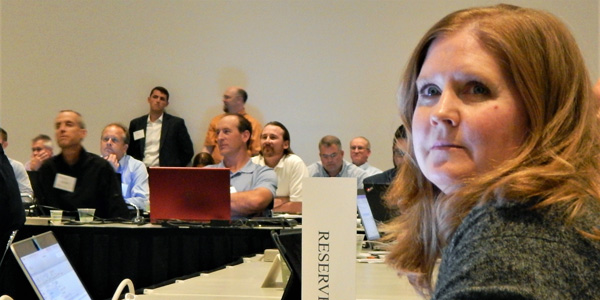By Tom Kleckner
DENVER — The divisions between SPP’s transmission owners and their customers could not have been starker than they were during the Markets and Operations Policy Committee meeting last week.
Twice, load-serving transmission owners overwhelmingly endorsed voting items favorable to their customers and companies. One was a revision to SPP’s transmission zone placement process. The second was a motion to reject staff’s recommended scope for a high-priority study that didn’t address their concerns with the RTO’s transmission planning process, which they say hasn’t resolved systematic congestion on certain parts of the system.
Both times, the larger number of transmission-using members — 77 of the committee’s 95 voting members — resulted in the TOs coming up on the short end after hours of back-and-forth comments.
“We had a good discussion. I’ll leave it at that,” MOPC Chair Paul Malone, of the Nebraska Public Power District, told the Strategic Planning Committee during its post-MOPC meeting Thursday.
Transmission Planning Process
Large load-serving entities complain that they are footing most of the bill for transmission expansions that also benefit transmission developers, wind developers and small municipal utilities and cooperatives.
Several members questioned the need for the high-priority study of congestion in the Texas Panhandle and western Oklahoma, pointing to recent changes to SPP’s transmission planning process. Staff have streamlined the number of assessments into a single 10-year study that will produce an annual expansion plan addressing reliability, economic and policy needs. The process’s first results will be shared in October 2019. (See “SPC, MOPC Approve Improvements to SPP’s Tx Planning Process,” SPP Strategic Planning Committee Briefs.)
A frustrated Greg McAuley of Oklahoma Gas & Electric told the MOPC that while the TOs weren’t in lockstep, they all want to protect customers from additional costs.
“What you see are those that have companies that have to pay for these things are being outvoted. That’s a concern this organization needs to reconsider,” McAuley said. “Our customers have just paid for [transmission planning process] improvements. What I’m hearing today is we’re asking [our customers] to pay another million dollars for another ad hoc study, because our process does not work.”
Transmission Zonal Placement
Kansas City Power & Light’s Denise Buffington, who shepherded the zonal-placement revision request (RR172), tried to take the MOPC’s rejection of her proposal in stride. While waiting for a runner to bring her a microphone during the SPC’s discussion of the proposal, she asked wryly, “Can I just scream?”
Buffington urged board members in attendance to consider adding additional municipalities and cities as members besides the large membership expansions, such as the Integrated System and Mountain West Transmission Group.
“Obviously, the votes that happened at MOPC show those that are paying the bills have less of a vote than those that aren’t paying the bills,” she said. “I encourage you to consider in your strategic-analysis plan all types of membership expansion that affects the pool and members.”
The load-serving TOs approved Buffington’s revision request by a 15-3 margin, with the Basin Electric and Western Farmers cooperatives joining Grand River Dam Authority in opposing it. However, the transmission-using owners voted down the motion 30-12, with seven abstentions, leaving the proposal 11 percentage points short of the necessary 66% approval.
“I just want to put everyone on notice that we will be appealing to the board,” Buffington said immediately after the vote. The Board of Directors and Members Committee meets July 25 in Denver.
“Shocker!” responded Heather Starnes, legal counsel for the Missouri Joint Municipal Electric Utility Commission and a nay vote.
Buffington has been working on RR172 for two and a half years to address what she says is a gap in the SPP Tariff.
Staff currently determine which of 18 transmission pricing zones to place new TOs in, which can result in cost shifts for those in the incumbent zone. (See SPP Advances KCP&L Cost Shift Proposal.)
The revision request was modified after “robust” stakeholder debate at the SPC and Regional Tariff Working Group, Buffington said. She said the modified RR172 is a “middle ground” and improves transparency in the new member zonal placement decisions by providing advance notice to TOs and their customers, allowing potentially affected entities to provide feedback before SPP makes a decision.
Buffington said RR172 also mitigates costs of zonal-placement decisions and protects both existing and new customers from cost shifts.
“This RR is primarily focused on the cost-shift issue … when SPP creates or expands multi-owner zones,” Buffington said. “KCPL has tried to come up with compromise but hasn’t been able to gain consensus. The alternative is litigation. To me, that’s a lot of risk on both parties.”
Some of those opposing the measure said there wasn’t enough time to study the revisions to the proposal. Others questioned whether the MOPC should be voting on a Tariff change without any working group’s approval. Some cited the “radical new policies” network customers would face in becoming TOs and fears of encroaching on FERC’s rate-setting authority.
“Does this group, as a Markets and Operations Policy Committee, really want to pass a Tariff revision when FERC should be the decision-maker? Rates are in the FERC purview,” said South Central MCN’s Brett Hooton. “We’ve had a lot of long SPC meetings on this topic. I don’t know that rehashing all that is going to change anyone’s opinion today.”
Starnes agreed with Hooton.
“We’ve beaten this horse until it’s bloody and no one recognizes it anymore,” she said, calling for the vote.




